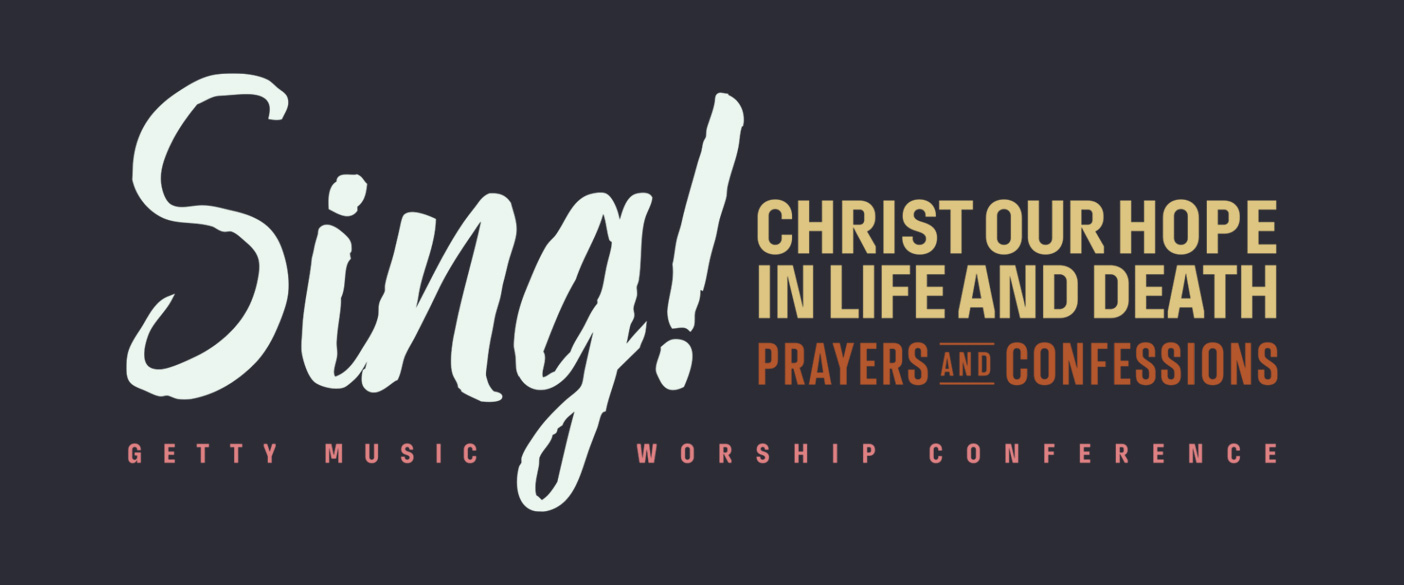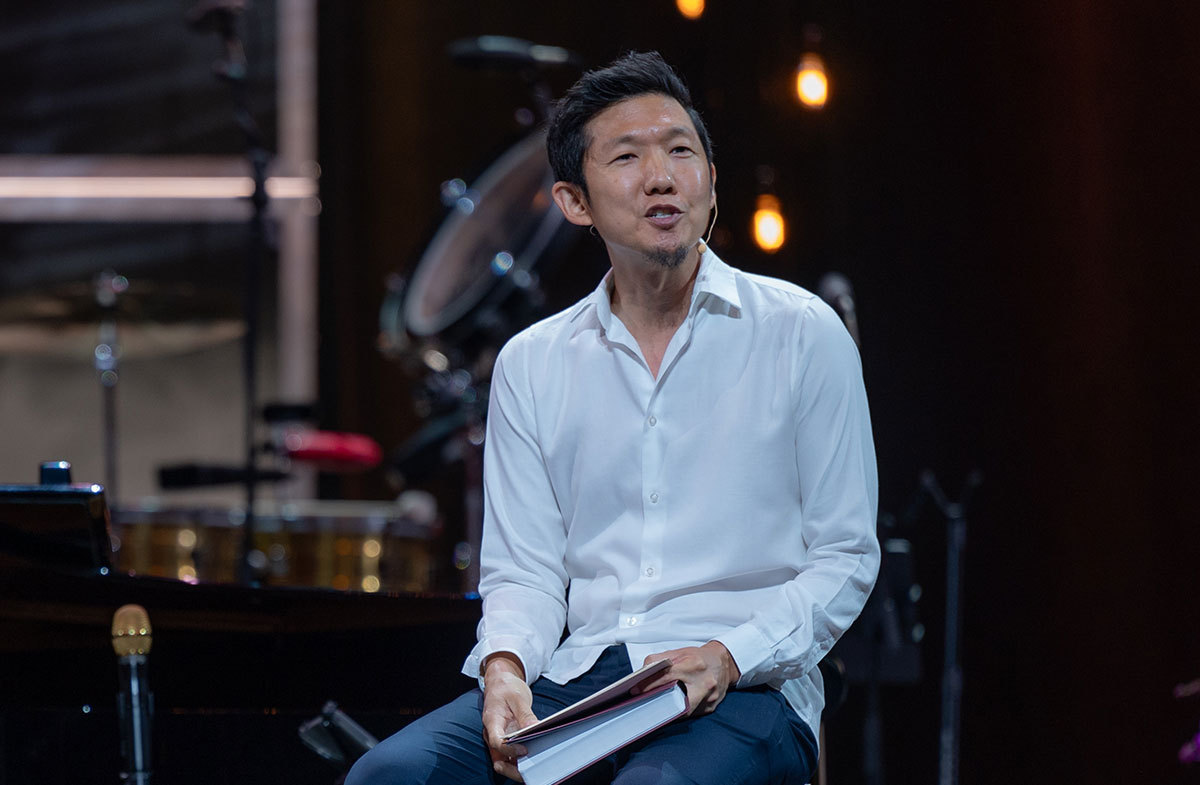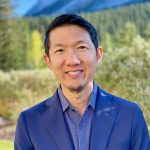How can Christians bring the gospel to the world in the 21st century? Michael Oh, global executive director / CEO of the Lausanne Movement, speaks with Keith Getty at the 2021 Getty Music Sing! conference.
Editor’s Note: The following is an edited transcript of the interview.
Keith Getty: Good to see you.
Michael Oh: Great to see you.
KG: What do you think of the band there? Pretty good?
MO: They’re good, yeah.
KG: Tell us about Lausanne. You’ve been the boss for how long?
MO: For eight and a half years leading the Movement.
KG: Fantastic. Tell us what it’s about for those who don’t know and tell us a little bit about what you’re up to and excited about at the minute.
MO: Well, first of all, I just want to say that the gospel is bearing fruit and growing throughout the whole world.
Applause.
MO: Those are the words of Colossians 1 and that’s also the heart of the Lausanne Movement. And yet at the same time, we live in a world that is incredibly divided and polarized—and Christians are not much better. So what is it that we can all agree upon? Four things.
Number one, we want to share the gospel with every person in the world. Number two, we want there to be disciple-making churches for every people group in the world, in every place in the world. Thirdly, we’d love to see Christ-like leaders being raised up for every church and every sector of society. And fourthly, we want to see kingdom impact in every sphere of society. That’s the four-fold vision of the Lausanne Movement, and toward that end we’re focusing on two numbers—99 and 2050.
First, 99. For too long the church has felt either excused or excluded from the Great Commission. 99 percent of the church. And that’s the 99 percent of the church who are not ministers or missionaries. But Ephesians 4:12 talks about how the ministry of the one percent is actually to be equipping the saints for the work of ministry, for the building up of the body of Christ. 2 Corinthians 5 talks about how Christ reconciled himself to us and gave us the ministry of reconciliation, and entrusted to us the message of reconciliation. In other words, this is the message of the gospel of Jesus Christ and also the ministry of the gospel. For the Lausanne Movement, we believe that one of the ‘secrets’ to the fulfillment of the Great Commission is the unleashing of the 99 percent for their ministry across the globe. We’re now building a digital global platform for the connecting and the collaborating of the disciple-making ministry of the 99 percent. So that’s 99.
Secondly is 2050. According to the PEW research center, 2050 is the year when Islam overtakes Christianity. Now we know how the story ends. But we need to respond to our times and help prepare for our grandchildren’s futures, and that’s why we are focusing on the year 2050 now. Currently 24 percent of the world is Muslim, 31 percent of the world is Christian. Our goal though can’t simply be quantitative—to be larger in number—we have to focus on being better qualitatively, to show the power and the beauty of the gospel in our lives that actually in turn will impact quantitative growth through our compelling message and through our compelling lives of the gospel.
So giving attention then to the qualitative side of disciple making is critical, not only making disciples but also maturing disciples—maturing as disciples as we learn to obey and live out the good news.
Another key focus for the Lausanne Movement over the next four years is actually to create a digital discipleship hub where Christians across the globe can grow in their discipleship with Christians across the globe. We imagine a day when a Christian in Zimbabwe could break digital bread with a Christian say in Nashville, Tennessee, a space where they could share testimonies, where they could pray together, they could listen to God’s word together, and encourage one another in their respective local ministries.

This gets back to actually what I shared last year at Sing! Global, which is that every single Christian has a shared identity and a shared mission. Our shared identity is as a part of the global family of God and our shared mission is being involved in God’s global mission. So the Lausanne Movement, we’re focusing on building a global digital platform for both.
This is critical because 2050 is not only when Islam overtakes Christianity, it’s also a world where we see several global crises coming together all at once. In 2050 there may be 200 million climate refugees in the world, people who are forced to leave their homes because of land erosion or lack of food or water. Scholars actually predict that the world in 2050 will face multiple pandemics, climate disasters, mass migrations, food insecurity, and a lack of food and water, and massive inequality, and growing debt. We confidently predict that the world will face all of these at once by the year 2050.
So we need to make disciples and be disciples who are ready for such a world and who want to be a part of building a better one.
KG: Talk to us about unreached people groups and to what extent is that in the world today as well.
MO: Yeah, so first of all an unreached people group is a distinct ethno-linguistic people where there is less than two percent Christian. For most UPGs, as we call them, there is a need then for outside resources and support to help them to reach their people with the gospel. And that’s where the work of missionaries is uniquely needed. Though we all have ministries, we are not all missionaries. Missionaries have a focus and a training to cross cultural, geographic, and linguistic barriers in order to bring the gospel to those who otherwise would have no opportunity.
So let me share briefly about three UPGs. And first of all,let me acknowledge that there’s a reality gap here. And what I mean by a reality gap is, you know, for example, why marriage can be challenging. You, Keith, have no experience—
KG: We have no problems.
MO: No marriage problems—no experience being a woman, right?
KG: That’s correct, that’s actually—
MO: Kristyn does. You have no experience of growing up having John Lennox as your uncle.
KG: No.
MO: Sadly. But you do share the experience of both of you being from Northern Ireland. But for all the things that you have no experience with, we basically cry out desperately in dependence upon the Holy Spirit to help bridge this reality gap. And the reality gap for most Christians in the West with most of the people in the rest of the world, whether Christian or not, is huge. So I want to ask you to have an open mind, to seek out opportunities to learn, and to cry out to the Spirit to help bridge that reality gap.
There are more than 7,000 unreached people groups in the world representing more than three billion people. Only the Holy Spirit can help us to bridge that reality gap. Only the Spirit can help us to understand how incredibly lost and dark the world is. Humans may not even have the ability to grasp the scale of three billion. Three billion people. But we can understand the value of one life. Even as you think about one person in your life who you loved, who died—if we think about the value of one life who died without Jesus Christ. And imagine they’re spending an eternity apart from God. Or the thousand people who will pass into eternity and into judgment without Christ during these 10 minutes that we have together.
Many people, not just Christians, have been concerned about Afghanistan. And you know there are a number of unreached people groups among their 38 million people. It’s a bad situation that’s only getting worse. This crisis could lead to many or even most Afghan Christians actually fleeing the country or being killed. I would ask that we pray for these 10-20,000 believers for wisdom and what to do, where to go, and how to survive. Pray for them as they are received into the borders and into the churches as well of Pakistan, Turkmenistan, Tajikistan, and Iran, and more.
Madagascar is another country with unreached peoples who are suffering severely right now. And this is where we’re going to need the Holy Spirit to help bridge this reality gap. I think a lot of people are probably familiar with this island off the coast of Africa for one reason and that’s because of the Madagascar animated children movies—cute lions and zebras, colorful vegetation and brightness— but the reality is not Disney-like. They are experiencing the worst drought in four decades that has devastated especially the south. Imagine having no rain for nearly four years. Imagine feeding your children nothing but cactus leaves and insects. Imagine not even having enough water to wash those insects before you eat them. May the Holy Spirit help us to bridge this reality gap.
And lastly, let me mention Pakistan. Pakistan’s been receiving the most Afghan refugees and they have also been strategically able to send missionaries into Afghanistan. That’s something that they can do that the American church cannot. I want to ask you to pray specifically for a 14-year-old Pakistani girl named Mehik. Mehik was raped forcibly, converted to Islam, and has been married now to a middle-aged man against her will. Her mother has been facing death threats because of the legal case to have her freed. In fact, on July 26th, her mother was shot by the man that her daughter was forced to marry. Mercifully she survived, but their nightmare continues. And sadly this is just one of thousands of stories like it. And please pray for Mehik and for Ezra, my friend who is her legal counsel.
KG: Our time is gone but give us sixty seconds—really quickly let us know what in coronavirus you’re seeing as new opportunities—because obviously the world has changed and new opportunities are there.
MO: First of all, I think it’s important to realize that there’s a clear overlap between the huge medical needs in COVID and the huge gospel needs. The 90 percent of the world that has no access to vaccinations is the same 90 percent that doesn’t have the gospel. So let me ask you just this one question, perhaps in closing. Have you ever considered for a moment the utter mercy of God that you were born into your circumstances? You just as easily could have been born as a son of a Shinto priest in Nagoya, Japan, or in the slums of Mumbai. And if you have been born in the slums of Mumbai or as the son of a Shinto priest, how would you want the people in this room to respond?
KG: That’s incredible. Everyone, why don’t we express our thanks to Michael for his thoughts and for everything he is doing. Thank you so much.

